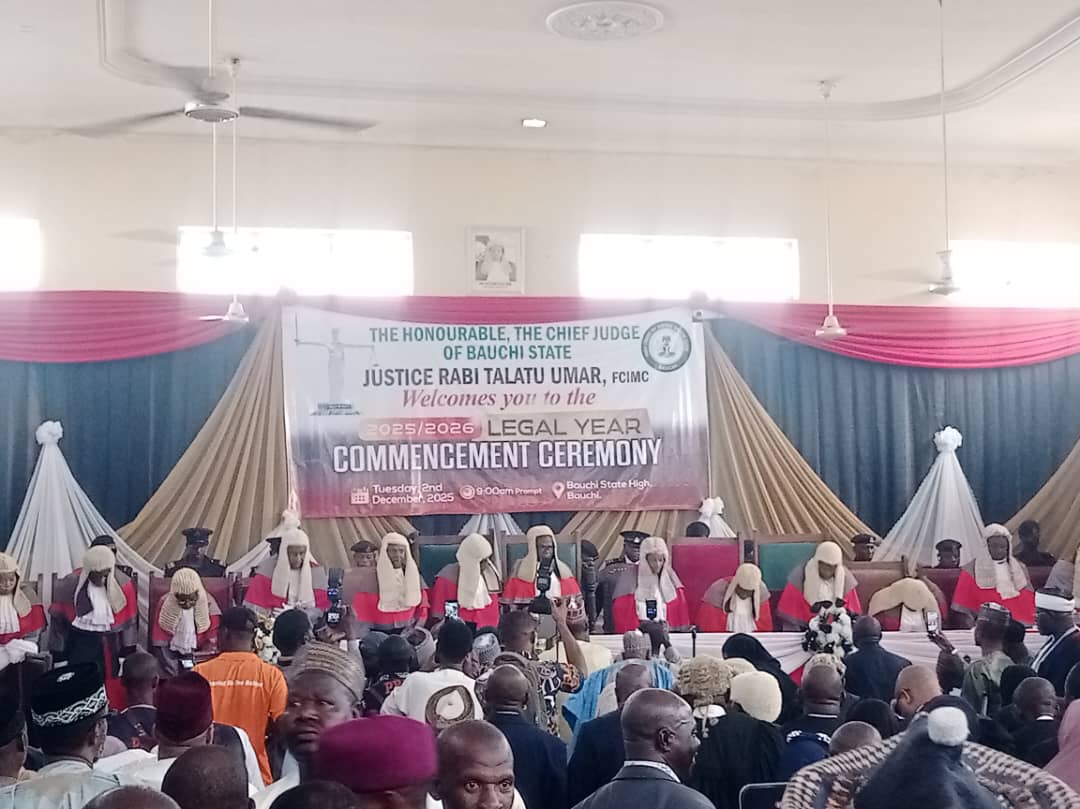News
Policemen Disarmed By Unknown Gunmen Cry Out Over Prolonged Detention

Police officers who were attacked, wounded and disarmed by unknown gunmen have raised the alarm over their continued detention for about five months without trial.
They spoke through their Counsel, Barrister Godwin Onwusi in a petition to the Inspector General of Police, through the A.I.G, Force C.I.D Annex, Enugu.
The petition, entitled: “Request/Petition For You To cause An Investigation Into the Long Unexplained and Unconstitutional Detention of The Under listed Police Officers By The Abia State Police Command”, was made available to DAILY POST on Wednesday.
Onwusi disclosed that Inspector Ubakwem Udoka, Inspector Sunday Alhamadu and Sgt. Udeogu Chidi were sometime in September 2022 attacked from behind, wounded and disarmed by unknown gunmen while they were at their barricade duty post, opposite the State CID, Umuahia.
He noted that they sustained serious injuries during the attack, while the attackers took away their arms, adding that since their detention, they have not been briefed on why they are being detained for that long, stating that the situation could discourage or demoralize other officers and men of the Nigeria Police Force.
READ ALSO: Again, Buhari’s Government Drops In Corruption Ranking
Onwusi pointed out that the officers have not also been charged to court, neither were they being paid salaries since then, noting that the development had brought untold hardship to the families of the officers who are dependent on the salaries of the officers.
He called on the authorities of the police to use their good offices to look into the case of the officers with a view to either releasing them, having kept them in detention for so long.
Onwusi, in the petition, copied to the Police Service Commission, disclosed that they have instruction of their clients to proceed legally to enforce the fundamental rights of the officers.
News
27-year-old Man Dies Inside Deep Well In Ogbomoso

The corpse of a 27-year-old man identified as Alagbe Gbemisoye has been recovered from a deep well at Ire-Akari, Adeniran area of Ogbomoso, Oyo State.
His body was retrieved by officials of the Oyo State Fire Service after passersby alerted them to the incident.
The circumstances that led to the deceased falling into the well were still unclear as of the time of filing this report.
The Special Adviser to the Governor on Fire Reforms and Chairman, Fire Services, Moroof Akinwande, said his men were alerted by a running caller and Mr Ajayi Olayemi.
READ ALSO:Oyo: Properties Worth Millions Of Naira Destroyed As Fire Ravages Residential Buildings
“Fire personnel led by CFM Oladejo promptly deployed to the scene. On arrival, it was discovered that a man of about 27 years old, named Alagbe Gbemisoye, had fallen into a deep well. His body was recovered and handed over to the DPO, Owode Police Station,” he said.
Akinwande urged the public to always observe safety precautions in their daily activities and emphasised the importance of having fire extinguishers in their homes to prevent fire incidents.
News
Bauchi Records 75 Homicide Cases, 28 Kidnapping Cases, Others – Official

The Bauchi state Ministry of Justice says it recorded nothing less than 75 homicide cases, 28 kidnapping cases and 86 cases of rape in the 2024-2025 legal year.
Barr. Hassan Usman (SAN), the Bauchi state’s Attorney General and Commissioner for Justice, stated this in Bauchi on Tuesday during the commencement of the 2025-2026 legal year ceremony.
“In criminal cases from January to date, we received a total of 91 robbery cases, as against last year which was 83 and we received 75 homicide cases.
“We were served with motions for bails and other motions totalling about 256 and we received about 86 rape cases and 28 kidnapping cases.
READ ALSO:Insecurity: We Shut Down Schools Because We Were Told To — Bauchi Governor
“In total, we received a total number of 592 criminal cases and out of this number, 97 have been disposed of, 15 were discharged through legal advice, 454 are pending,” said the Commissioner.
According to him, given the high volume of cases recorded, the Ministry developed strategies to fast-track prosecutions in line with the administration of criminal justice law that emphasised speedy trials by setting timelines of filing charges in court and proceeding.
While explaining that Gov. Bala Mohammed approved the release of N7.8 million for the purchase of law and other practice books for their library, Usman added that Mohammed also approved the release of monthly funds to settle all outstanding judgement debts owed by the state government.
He appreciated the governor for his benevolence, unwavering commitment and exceptional support for the Ministry of Justice in the state.
READ ALSO:Bauchi Govt Procures 13 Tuberculosis X-ray Machines Worth $1.9m
Earlier speaking, Justice Rabi Umar, the State’s Chief Judge, lamented the recurrent practice of arraigning suspects in court without proper preliminary investigations.
She added that in many cases, efforts to gather evidence were only initiated after the trial had begun.
“This backward approach to criminal prosecution significantly delays the process and undermines the delivery of justice.
“It is unacceptable that in 2025, we continue to see such practices, which contributed to the overwhelming backlog of cases in our courts and ultimately eroded public confidence in the Justice System.
READ ALSO:Witchcraft: FIDA Sensitises Stakeholders On Accusations In Bauchi
“To resolve this and other identified lapses, a Committee was set up to review the Bauchi state Administration of Criminal Justice Law and come up with a Draft Law that will stand the test of time,” she said.
She however, affirmed that any lawyer that didn’t adhere to the prescribed dress code for legal practitioners in the state would not be permitted to appear in court, adding that such a disregard for professional decorum undermined the prestige and global respect that the legal profession commands.
In his speech, governor Mohammed said that the three arms of government in the state had been working harmoniously and in synergy without compromising their constitutional autonomy.
Represented by his deputy, Alh. Auwal Jatau, Mohammed said that he has been giving the two other arms of government the necessary support and cooperation to ensure that they all operated optimally without any hindrance.
News
HIV: 29,874 Bauchi Residents Under Treatment, 650 Infants Recover From Infection – Commissioner

The Bauchi State Government has said that it is currently treating a total of 29,874 people living with HIV with Antiretroviral treatment across the state.
Dr. Sani Mohammed Danbam, the Commissioner for Health and Social Welfare, disclosed this while speaking at a press conference jointly held with partners to commemorate the 2025 World Aids Day.
According to him, HIV affects the most vulnerable in society: the poor, the uneducated, the marginalized, women, and children.
He said AIDS remains incurable, but no longer has to be a death sentence.
Speaking on the HIV situation in the State, Danbam said, “as of today, a total of 29,874 people living with HIV are receiving (Antiretroviral Therapy) ART and the State has scaled up to 863 HTS/PMTCT facilities, where the general population and pregnant women receive free HIV services.
READ ALSO:Bauchi Govt Procures 13 Tuberculosis X-ray Machines Worth $1.9m
“This year, we have successfully placed 2,246 newly diagnosed HIV-positive individuals on antiretroviral treatment, and over 650 HIV-exposed infants have achieved 100% early infant diagnosis and remain free from HIV infection.”
This year’s theme for World Aids Day: ‘Overcoming disruption, transforming the AIDS response’, Danbam said is to reflect the challenges caused by recent funding cuts and other setbacks, and “it reminds us of the need to build a stronger, more resilient and rights-focused approach as we work toward ending AIDS as a public health threat by 2030.”
Also, the Executive Director, United Nations Population Fund (UNFPA), Diene Keita, noted that in spite of advancements in medical technologies and public policies, progress made over decades was increasingly jeopardised, with prevention gains eroding as essential services struggled to reach people at elevated risk.
Represented by Deborah Tabara, Gender/Reproductive Health Analyst & State Programme Officer, UNFPA Bauchi, stressed that severe cuts in international aid were destabilising HIV prevention efforts, particularly in sub-Saharan Africa, where millions relied on donor-supported programmes to access accurate information, prevention tools and essential community-based support.
READ ALSO:Bauchi Govt Procures 13 Tuberculosis X-ray Machines Worth $1.9m
According to Keita, almost 2.5 million people have lost access to lifesaving Pre-exposure Prophylaxis due to shrinking resources, with countries recording half of last year’s new HIV infections experiencing the harshest consequences from dwindling funding.
Tackling gender inequality, violence and stigma in healthcare systems and societies more broadly will be instrumental in reducing factors that put people at risk of HIV. Integrating HIV services into routine sexual and reproductive healthcare, including family planning and maternal health, would make them more readily available to many women and girls.
“At this crossroads in the AIDS response, UNFPA continues to support countries in sustaining and improving HIV prevention, particularly for adolescent girls, young women and key populations, along with providing treatment and related services.
“The combined efforts of governments, international organisations, activists and communities have led to remarkable progress on HIV, saving nearly 27 million lives to date. Now, we need to come together and finish what we know works and what we know is possible – an AIDS-free future for all.”

 News4 days ago
News4 days ago(VIDEO) Obasanjo To Tinubu: Why Are We Negotiating With Bandits?

 News5 days ago
News5 days agoNaira Records First Depreciation Against US Dollar Across Official, Black FX Markets

 Headline4 days ago
Headline4 days agoFULL LIST: US To Review Green Cards From 19 ‘Countries Of Concern’ After Washington Shooting

 News3 days ago
News3 days agoInsecurity: What Sheikh Gumi Told Me After Visiting Bandits Hideouts — Obasanjo

 Politics3 days ago
Politics3 days agoTinubu Sends Ex-INEC Chair, Former Oyo First Lady, 30 Additional Ambassadorial Nominees To Senate

 News4 days ago
News4 days agoVIDEO: Jonathan Breaks Silence On Guinea-Bissau’s Military Takeover

 Entertainment5 days ago
Entertainment5 days agoMy First Son Not Interested In Taking After Me – 2Face Reveals Nino’s Ambition

 Metro4 days ago
Metro4 days agoRetired Judge Killed In Delta

 News4 days ago
News4 days agoWhy I Returned To Nigeria On Ivorian Jet — Jonathan

 News1 day ago
News1 day agoBREAKING: Ex-CDS Musa meets Tinubu At Aso Villa




























